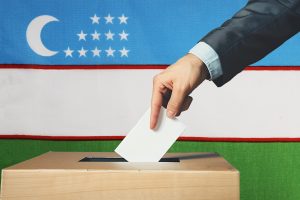Uzbekistan’s ruling party, the Liberal Democratic Party of Uzbekistan (O’zLiDeP), increased its share in the country’s parliament after an election branded by the government as another step in its reform journey.
Observers said the October 27 poll took place in a constrained political environment in which voters were not provided a genuine choice.
According to the Central Election Commission, O’zLiDeP will received 64 seats in the new parliament – an increase over the 53 it previously held. Milliy Tiklanish (the National Revival Party) will seat 29 deputies, a drop from 36. The Social Democratic Party Adolat will seat 21, a drop from 24. The People’s Democratic Party of Uzbekistan (PDPU), which previously held 22 seats, gained only 20; and the Ecological Party, which previously had 15 seats, took 16.
The election took place under new rules ,which ostensibly sought to strengthen parties by splitting the method in which the 150 members of the parliament’s lower chamber are elected. In the new set-up, 75 deputies were elected via party-list and 75 in individual mandates.
O’zLiDeP, which was founded by Islam Karimov in 2003 and has always dominated the country’s parliament, came out on top in both methods of polling: taking 38 seats in the individual mandate race and 26 by party list.
No independent candidates were permitted to run and no new political parties have been allowed to register. Those that have attempted to enter the political arena – such as Xidirnazar Allaqulov and his Truth, Progress, and Unity party – have faced denial and considerable pressure.
The OSCE election observation mission concluded in its preliminary findings after the October 27 vote that “the ability of citizens to participate in political life remains disproportionately constrained by legislation and in practice, in particular regarding respect for fundamental freedoms of association, peaceful assembly, and expression.” The campaign, the preliminary report noted, “was low-key and contestants avoided publicly criticizing or challenging the policies of the ruling party or each other.”
In 2019, when The Diplomat covered that year’s parliamentary election – the first since Karimov’s 2016 death– from Tashkent, one voter encapsulated a view of the political arena that remains apt. “We have five parties, but in fact it’s like one party divided into five pieces,” a pensioner named Serik told me. “It’s going to take some time – 10, 50 or maybe up to 100 years – for a real democratic parliament with opposition in it.”
Only 5, 45, or maybe 95 years to go.
































